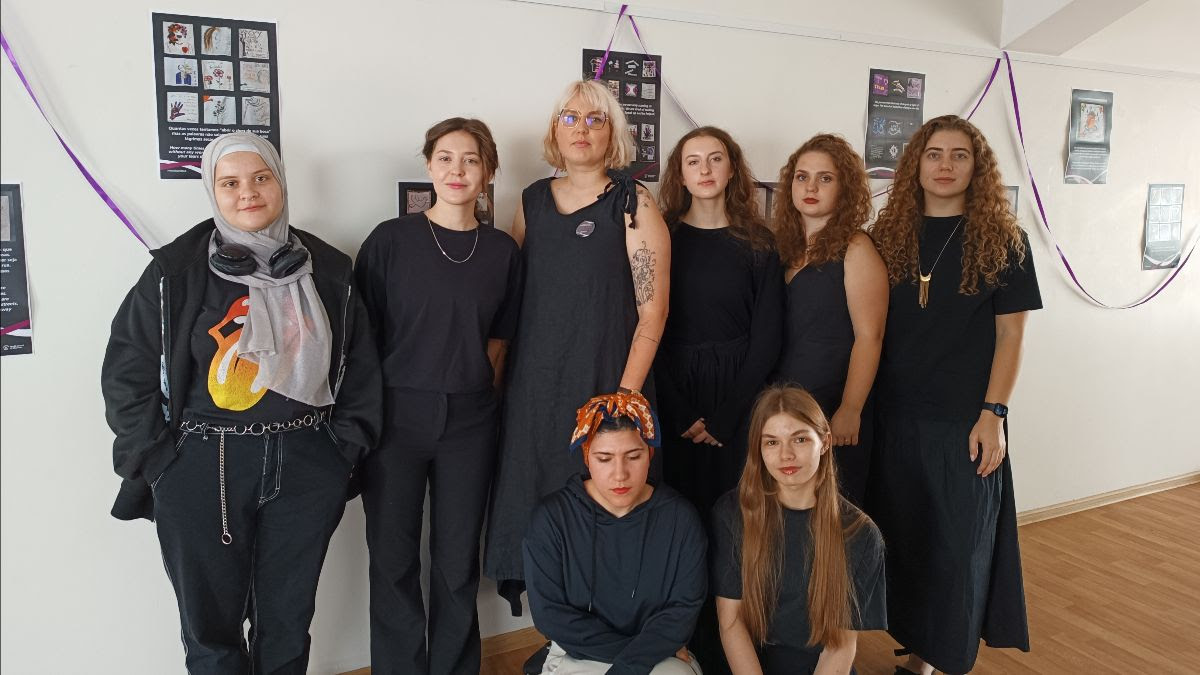Walking quietly and listening deeply. As students and faculty from the LCC International University in Klaipeda, Lithuania viewed a Waterfall of Solidarity and Resistance exhibit and listened to the stories from survivors of gender-based violence, their reactions were emotional. Ieva Rūkė, peace programs coordinator for the university’s Center for Dialogue and Conflict Transformation, noted surprise, sadness, grief, loss, fear, and anger in observers that people had to go through such experiences. The poster exhibit presents the panels from the Waterfall of Solidarity and Resistance tapestry first displayed at the World Council of Churches (WCC) 11th Assembly in 2022. “Participants walked quietly and took time to read the posters,” said Rūkė. “Groups of individuals would chat quietly together as well.” People also expressed thanks that the awareness-raising on the topic of gender-based violence was done in a way that showed healing—not just glorification of victimhood. In addition, those who walked through the exhibit said they found it moving and educational. “While a hard topic to be reminded of, it was also a very needed one in this context to be acknowledged, and emotions of gratitude were expressed that we bravely discussed this topic,” said Rūkė. Connections and origins The Thursdays in Black campaign first came to LCC International University through the director of the Center for Dialogue and Conflict Transformation, Naomi Enns, who was also the Mennonite Central Committee West Europe representative from 2017-2020, attending World Council of Churches meetings during that time. Enns, who teaches a university-wide core course called “Conflict Transformation and Civic Engagement,” cites Thursdays in Black during her class as a model for public engagement. The center focuses on promoting and training in conflict transformation, resilience, research, action and advocacy, awareness raising, and peace dialogue skills for the university community as well as extending out collaboratively to regional and international peace partners, the Klaipeda community, and the communities from which students come. The LCC International University enrolls students from about 60 countries, with most currently coming from Ukraine and Lithuania. “Our aim this year is to help shift the narratives of violence to ones that are more peaceful in the behaviors, attitudes, and feelings expressed in order to nurture a culture of peace on campus and as a catalyst for transforming relationships and equipping communities through mutual learning, discovery, and action—especially in the public spheres in ways that promote social wellbeing and engagement with diverse social voices,” explainedEnns. Shedding light into darkness The exhibit was coupled with a panel discussion. “This is not an easy topic to bring into the social spheres of life here,” acknowledged Rūkė. “However, attendees recognized the importance of the theme, the need to be made more aware, and shed light into the dark, violent experiences many in our communities here come from or are living with.” The survivors’ stories deeply impacted the listeners. “The discussion flowed from individual survivor stories of watching gender-based violence occur in the home, to rape and fear of males when visiting another person’s home,” said Rūkė. “Ideas on ways to find healing, both at the personal level as well as interpersonal, were shared as well as grounding tips for victims and those still on a journey towards surviving.” Cycles of violence—and the impact they have on people and society—were pointed out. Rūkė also observed “healing through sharing of stories and the need for witnessing through shared stories as a way of assisting those on the journey,” adding that experiences of harassment and how to get help for it were also discussed. Gender-based violence in Lithuania is a very relevant topic, since the nation experiences one of the highest rates of femicide in Europe, and over 1 in 3 women have experienced physical and/or sexual violence. In the region in which the university is located, two-third of families have been impacted by gender-based violence. “Moreover, Lithuania is one of the few EU states that is refusing to ratify the Istanbul Convention,” said Rūkė. “There is so much need for discussion and work that needs to be done here.” The Istanbul Convention, which opened for signature in 2011, is the first instrument in Europe to set legally binding standards specifically to prevent gender-based violence, protect victims of violence, and punish perpetrators. Future plans The Center for Dialogue and Conflict Transformation plans to continue the Thursdays in Black campaign, highlighting it throughout year. The university’s student council is planning to look more in-depth at education around harassment and policies for student assistance. Together they are looking at ways to broaden the awareness through collaborative efforts with Klaipeda University and regional partners. Thursdays in Black Just Community of Women and Men | 


No comments:
Post a Comment